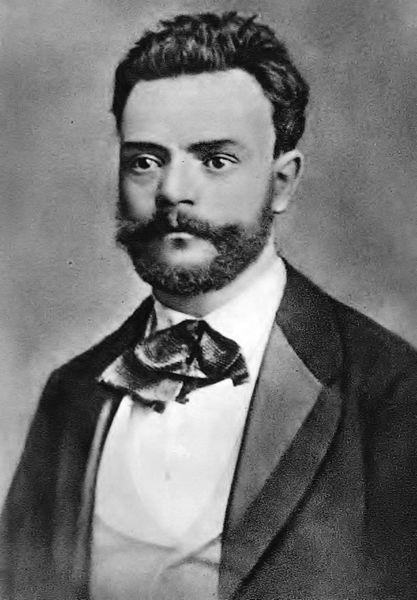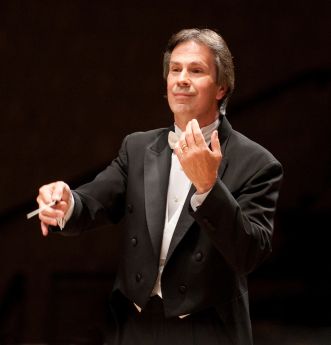Chicago Master Singers present a moving, powerful account of Dvořák’s “Stabat Mater”

One must give great credit to Alan Heatherington. Not only does he lead consistently inspired concerts with Ars Viva — the Chicago area’s finest chamber orchestra — but the conductor also directs venturesome programs with his two other ensembles, the Lake Forest Symphony and the Chicago Master Singers.
The latter group opened its 32nd season with a genuine choral rarity, Dvořák’s Stabat Mater, presented Friday night at Divine Word Chapel in Techny.
The Czech composer’s most familiar music largely breathes an air of optimism, pastoral lyricism mingling with dynamic energy.
But Dvořák also saw his share of great personal tragedy. In 1875, the composer’s infant daughter died, as did two other children in 1877. Begun after the death of his first child, Dvořák returned to work on the Stabat Mater in the wake of his grief over the passing of the two siblings, completing the oratorio later that year.
The result is one of Dvořák’s finest achievements, a deeply personal work yet universal in its transcendence of great suffering, and richly reflective of the composer’s strong Roman Catholic faith. The Stabat Mater remains largely unperformed like most of Dvořák’s operas and other choral works (though the Grant Park Music Festival presented a memorable account of his Requiem in 2010).
Cast in ten slow movements and spanning nearly ninety minutes, the Stabat Mater is the antithesis of the kind of instant musical gratification and conservative short-attention-span theater that dominates too much of today’s concert programming.

Kudos to Heatherington for taking on this deeply felt and demanding work. With an hour and a half of slow music, the Stabat Mater can be a haul, even for the most committed Dvořákian. But Heatherington excels in works that seem to need that extra bit of care and advocacy.
Friday’s performance had its debits, including ragged horns in the opening bars, some pitchy wind and brass tuning and an overripe acoustic that made the chorus’s consonants a sometime thing.
But what came through powerfully was the deep emotion and intense spirituality of the music. Dvořák’s journey is one of inexorable progression out of darkness towards light, from the minor-key melancholy of the opening four movements to the growing hope and eventual radiant benediction of the concluding Quando corpus morietur.
Heatherington’s focused, scrupulous direction of his forces — vocal quartet, orchestra and large chorus—conveyed the central devotional aspect as well as the intense drama of the music, deftly varying the slow tempos to provide expressive variety.
Heatherington brought a sense of rugged strength to the rising theme of the large-scale opening movement (Stabat Mater dolorosa) with an overwhelming impact to the choral climax. So too the consolatory aspect of the flowing chorus, Tui nati vulnerati, was surely conveyed and the conductor’s careful dynamic marking of the concluding pages brought the right sense of spiritual grace and repose.
The performance was aided by a fine group of soloists. Michelle Areyzaga’s bright soprano soared over the forces thrillingly in the dramatic moments and she blended nicely with the ardent tenor Peder Reiff in the duet, Fac, ut portem Christi mortem. Bass Gerard Sundberg brought stentorian drama to Fac, ut ardeat cor meum, while mezzo-soprano Sarah Holman proved more mixed, thin toned and inexpressive in the penultimate, quasi-Baroque section, Inflammatus et accentus.
The Chicago Master Singers — 129 strong — delivered daunting corporate power, dramatic point and dedication in their challenging role. For a non-professional chorus, the vocalism and tonal refinement was largely impressive with the singers showing commitment and stamina over the long evening. The Ars Viva orchestra — without its significant CSO contingent — played well, with particularly golden and glowing strings.
There are not many opportunities to hear Dvořák’s Stabat Mater and it’s well worth the drive to the North Shore to catch tonight’s repeat performance.
The first half, devoted to music of Mozart, proved more variable, largely for logistical reasons than any fault of the performances.
Where Dvořák’s Stabat Mater is meditative and inward-looking, Mozart’s Coronation Mass is joyful and ebullient, making a neat contrast with the evening’s other major work.
Divine Word Chapel is a remarkable venue, but the vast space is also massively resonant with about a six-second decay, which proved problematic in the predominant faster tempos of Mozart’s mass.
Despite Heatherington’s well-judged direction and the chorus’s (seemingly) admirable singing, much of the performance was undone by the murky haze of the acoustic. There were some bright spots like the majestic opening Kyrie and Areyzaga’s sweetly sung solo in the concluding Agnus Dei. But too much of the choral singing was reduced to a generalized blur with words and even entrances barely decipherable. Using a smaller choir for the Mozart likely would have helped.
The opening of Mozart’s Ave verum corpus suffered less from the resonance, setting the tone for the evening with an apt elegiac dignity and stately repose.
The program will be repeated 7 p.m. Sunday. chicagomastersingers.org; 877-825-5267.
Posted in Performances




